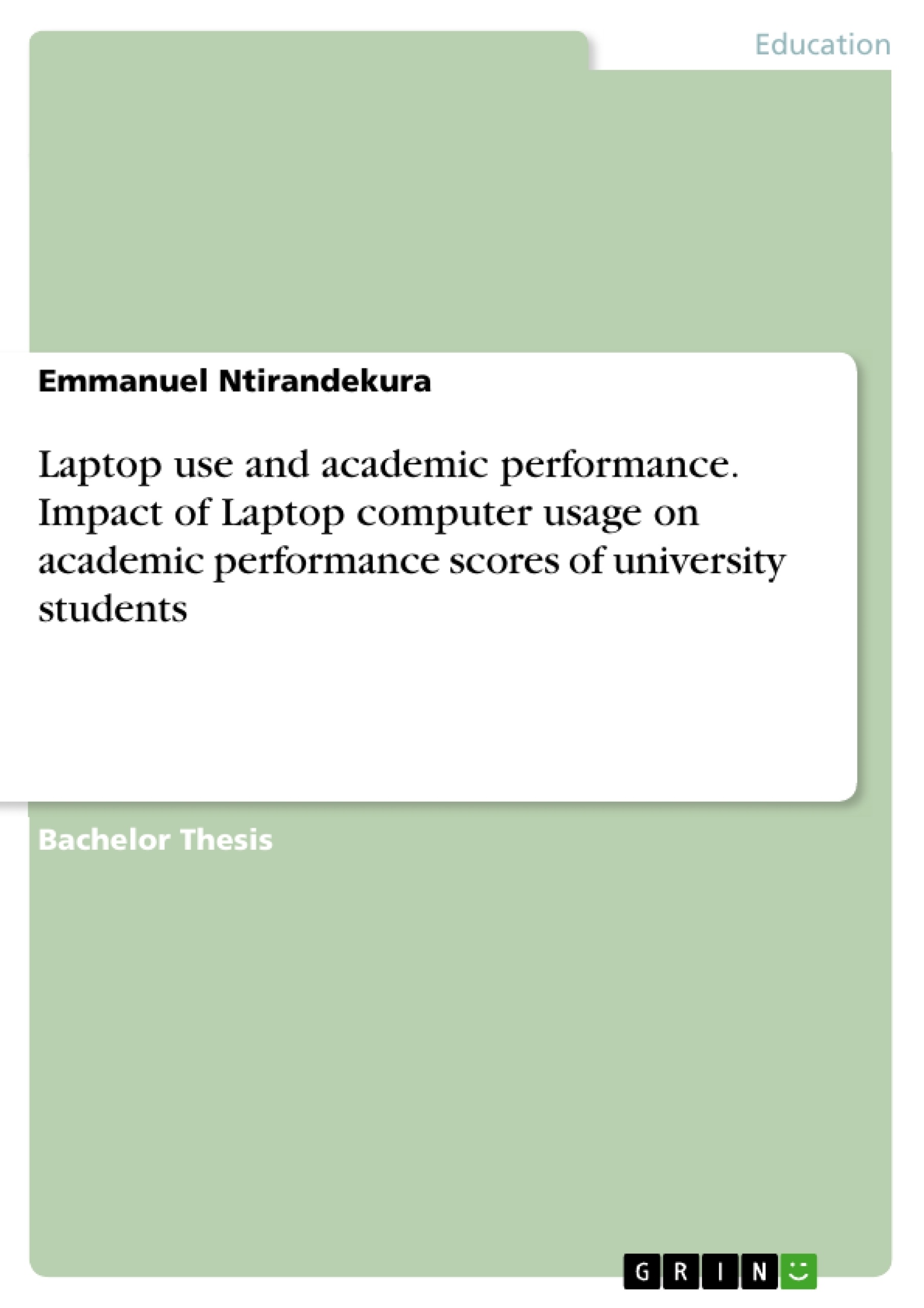As technology use continues to rise, especially among young individuals, there are concerns that excessive use of technology especially laptop computer may impact academic performance scores. Researchers have started to investigate the possible negative effects of technology use on college academic performance, but the results have been mixed. The objective of this study was to test at what extent does laptop usage affect student’s academic performance for undergraduate’s students in University of Rwanda, Huye campus-college of Business and Economics. The total sample size was 235 students in which 91 students, own laptop computer and 144 did not own laptop computer, all students were from year one, two and year three applied statistics based on multistage sampling design. Self-administered questionnaires were used to obtain data to be used in analysis, asking questions regarding to the ownership of laptop, type of use, laptop literacy and internet use frequency. Two types of hypothesis were used to test for any relationship between academic performance and laptop use, hypothesis one set as: “There are no evidences for the differences exist in performance scores of students who use computer and non-computer user irrespective the purpose of use” and hypothesis two was: “There is no Statistical difference in average marks of
students who own laptop computer and students who don’t have computer”.
To test the plausibility of these statement the study employed both binary logistics regression to see who is likely to perform well and two independent sample t-test sought to reveal exact difference between categories of laptop use on which was categorized students into low laptop users and higher laptop users.
The study results revealed, that all hypothesis has been rejected from all tests used in the analysis, the two independent sample t-test rejected the 2 hypotheses at 5% level of significance (0.041; 0,001<0.05) respectively. The binary logistics regression results revealed that being a high laptop user was associated with increased in likelihood of being high performing well (OR=7.327, P-value<0.05), and being a laptop owner was associated with increased in likelihood of being high performing well (OR=0.151, Pvalue<0.05), By holding other factor constant, laptop owner has probability of 13.1% for increase in odds of performing well compared to none laptop owner.
Inhaltsverzeichnis (Table of Contents)
- CHAPTER. I. GENERAL INTRODUCTION
- I.1. Background of the study.
- I.2. Problem statement...
- 1.3. Objective of the study
- I.4. Research questions.
- I.5. Research Hypotheses.......
- 1.6. Scope of the study..
- I.7. Organization of the study
- CHAPTER. II. THEORETICAL AND CONCEPTUAL FRAME WORK
- II.1. Basic concept definitions
- II.2. Literature review
- II.2.1. Introduction...
- II.3. Theoretical Framework
- II.4. Empirical review.
- II.5. Conceptual and operational definitions
- CHAP.III. RESEARCH METHODOLOGY
- III.1. Design of the study
- III.2. Population of the study
- III.3. Selection criteria.
- III.4. Sample and sampling technique...
- III.5. The Population and Sampling frame.
- III.6. Sampling technique.
- III.7. Method of data collection
- III.8. Procedure
- III.9. Method of data analysis..
- III.10. Research process operationalization..
- CHAPTER.IV: PRESENTATION, ANALYSIS AND INTERPRETATION OF FINDINGS.
- IV.1. PRESENTATION
- IV.2. Description of variables included in study
- IV.3. Inferential statistics analysis.......
Zielsetzung und Themenschwerpunkte (Objectives and Key Themes)
This dissertation aims to investigate the impact of laptop usage on the academic performance scores of students at the University of Rwanda, Huye Campus. The research seeks to understand the relationship between laptop usage and academic achievement, exploring factors that may influence this relationship.
- Impact of laptop usage on academic performance scores.
- Factors influencing the relationship between laptop usage and academic performance.
- Analysis of student demographics and their laptop usage patterns.
- Evaluation of the effectiveness of laptop usage in facilitating academic success.
- Recommendations for optimizing the use of laptops for enhanced academic performance.
Zusammenfassung der Kapitel (Chapter Summaries)
- Chapter I. GENERAL INTRODUCTION: This chapter lays the foundation for the research, providing context through a background of the study, problem statement, objectives, research questions, hypotheses, scope, and organizational structure.
- Chapter II. THEORETICAL AND CONCEPTUAL FRAME WORK: This chapter explores the theoretical and conceptual frameworks that underpin the study. It delves into basic concept definitions, presents a comprehensive literature review, outlines the theoretical framework, examines empirical reviews, and defines concepts operationally.
- Chapter III. RESEARCH METHODOLOGY: This chapter details the research methodology employed in the study. It explains the study's design, identifies the population, defines selection criteria, outlines the sampling technique and sampling frame, explains the data collection methods, and discusses the data analysis procedures.
- Chapter IV: PRESENTATION, ANALYSIS AND INTERPRETATION OF FINDINGS: This chapter presents the findings of the study, focusing on the presentation and analysis of data. It describes the variables included in the study and conducts inferential statistics analysis to interpret the findings.
Schlüsselwörter (Keywords)
This dissertation focuses on the keywords: laptop usage, academic performance, University of Rwanda, Huye Campus, student demographics, statistical analysis, research methodology, impact assessment, and academic achievement. It explores the complex relationship between technology integration and educational outcomes.
- Quote paper
- Emmanuel Ntirandekura (Author), 2017, Laptop use and academic performance. Impact of Laptop computer usage on academic performance scores of university students, Munich, GRIN Verlag, https://www.grin.com/document/388871



